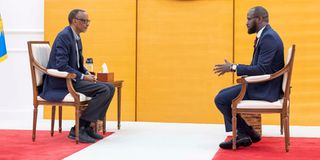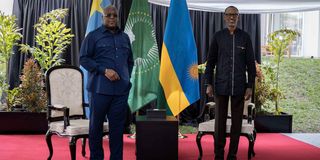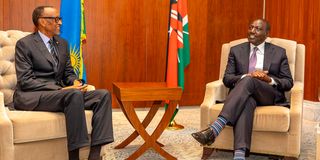Kigali is in a reflective mood. Thirty years after the Genocide against the Tutsi, some cloud still hangs over the land with 1,000 hills.
For the man who led an army across the border from Uganda to reclaim a country steeped in divisions and hatred that culminated in an orgy of despicable violence, President Paul Kagame finds himself cornered by thoughts that should dominate every mind in Rwanda.
He walks into our interview set in Urugwio village, the seat of power in Kigali, some minutes past noon.
The body language suggests he is ready to dispense matters fast. A soft handshake, smile, a brief chit-chat and walk to the set.
The President places the mic on himself. It is clear this is important for him as the room empties, never full of handlers. This is unlike other State Houses.
Sitting in front of me is a man who liberated his country, marched an army for hundreds of kilometres, pacifying villages, setting the FLDR – the militia that was responsible for the genocide – on its backfoot and ending one of the worst atrocities in the recent past.
“What should we talk about?” he jokes.
Small talk in between interviews is a drag, the worst form of human existence partly because they are supposed to cut tension. I have, however, found that they make it worse.
I mumble some things. He agrees, but we want this interview, or rather this performance, to get underway. Interviews are like a dance both parties attempt to get their good side out.
A story is told of a general in Kagame’s ranks, whose troops were among the first to reach a part of the hill that is present-day Kigali.
Apparently, there was panic in the rank-and-file and he cabled back saying there must be a problem with the coordinates.
The area they had taken was nothing but tiny hill and he could see no town.
The town he was looking for is perhaps the Kigali of today, a vibrant, orderly and a lit city.
“The town we found here is not what we have now,” President Kagame says.
He is pleased with what Rwandans have achieved.
“Good things tend to happen in this town,” he says when asked about rumours of a Formula One circuit roaring to Kigali.
Rwanda has placed itself as the place to go to for conferences. It is hosting NBA games, and Kagame is right, good things indeed tend to happen to Rwanda.
Still, there are clouds hanging and sitting with the President in this tell-all interview.

Paul Kagame of Rwanda during the interview with Nation Media Group’s Managing Editor, Newsroom Production James Smart.
Photo credit: Pool
It is clear that he feels his predominant and paramount objective to protect Rwanda overshadows anything and everything else.
The conflict in the Democratic republic of Congo has sucked in Rwanda. It is a cause of constant worry, threatening to turn into an all-out war.
I ask the President if Rwanda has soldiers in eastern DR Congo.
“If I make a slip of the tongue on that question, every other problem will be forgotten and the story will be: ‘see, even Kagame has admitted to having forces in the DR Congo’,” the President tells me.
Kagame goes on to great detail about meetings in Nairobi with his DR Congo counterpart Felix Tshisekedi after shells were reportedly fired by Congolese forces into Rwanda.
“I told him, it’s okay once, may be a mistake, but twice, three times and a fourth time, that’s something else,” he says, adding that the situation on the DR Congo border can be described as Rwanda protecting herself.
“I wouldn’t need anyone’s permission to do whatever I need to do,” he says.

Rwandan President Paul Kagame (right) with the Democratic Republic of Congo President Felix Tshisekedi pose for a photograph at the Serena Hotel in Rubavu, Rwanda, on June 25, 2021.
Photo credit: File | AFP
The assertiveness of this response tells what needs to be known of the complexity of the conflict.
United Nations agencies say the humanitarian toll in that part of the world is staggering. News of violence in villages, photos of corpses and reports of cannibalism continue to dominate screens.
How then does all this play into the mind of a man who has been at the helm of the country for almost three decades?
Kagame is, of course, a calculating man. He smiles when he needs to, searches his mind often and wears the perfect poker face. Nothing out of sync.
It is obvious that the internal political situation in his country comes as somewhat of an inconvenience.
A day earlier, Kagame’s RPF party had nominated him for a fourth term to run for the presidency.
Talking about this moment and part of the interview, Kagame briefly drops his shoulders.
“For now, let me carry the burden,” he says, then goes on in detail on how he has asked party loyalists to find a successor.
A lot will need to be built before that because the man who is shouldered with that responsibility has for decades single-handedly managed with scrupulous care, the interests, principles and sentiments of that society.

President William Ruto with President Paul Kagame of Rwanda.
Photo credit: PCS
How does one transfer that mandate after it has been domiciled in one quarter for that long?
For a man who rose from humble exertions to head a nation, what happens next is like a 3-D chess game. Finding that combination of personal fitness, loyalty to party and service and to harmonise that into a Rwanda of the future will not be a mean feat.
President Kagame appears like a man who is oppressed with the load of responsibility that is upon him.
He has the marks of a mind that scans closely, canvasses thoroughly, concludes deliberately and hold to such conclusions unflinchingly.









